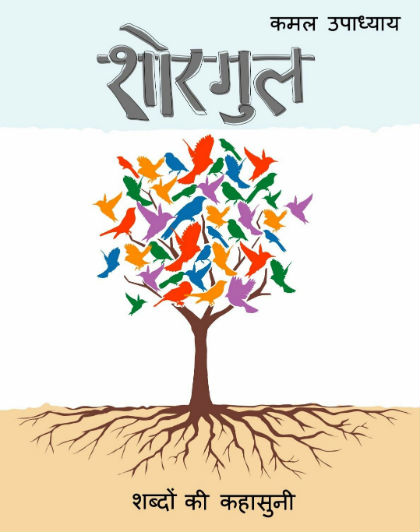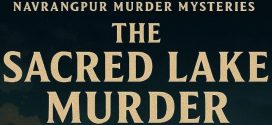Kamal Upadhyay is an author we came to know about through a satire named “Lankapati Ka Loktantra”. Current political scenarios and mythology are weaved quite nicely in that satire. You can read our detailed review for the same at the link below:
Reading “Lankapati Ka Loktantra” made us curious to know more about him, and eventually, we have had an author interview with him. You can find it at the link below:
This Is Here In For You
Listen To The Podcast:
If you love to listen to the book review over reading, or if you want to go through it while doing other activity, here is our Podcast of this review article. Do listen, and share your thoughts with us.
Spotify:
YouTube:
| Book Title | : | Shorgul: Shabdon Ki Kahasuni (शोरगुल: शब्दों की कहासुनी) |
| Author | : | Kamal Upadhyay |
| Publisher | : | Eva Publication [self published] (11 December 2019) |
| # of Pages | : | 247 KB, 176 (Kindle EBook) |
| Purchase Link(s) | : |
Our engagement with the author and his other works proceeded forward quite strongly and we got a chance to read more books by him. The last one was “ILU“, a Hindi short EBook about a bird and its journey. Today, we are going to talk about his latest book शोरगुल: शब्दों की कहासुनी.
शोरगुल: शब्दों की कहासुनी is a poetry collection. Well, calling them poems would be better. Some of them are quite small. Let us take a look at the cover page of this small EBook before we talk further about it.

शोरगुल: शब्दों की कहासुनी (Shorgul) | Book Cover
शोरगुल refers to the chirping of birds (शोर= noise गुल = bird), however, it is used differently in different contexts. The author, as he says in the book information, refers to it as a collection of his feelings and thoughts.
The cover page shows a tree where the leaves are made up of different colorful birds flying in different directions while chirping. So, it is a well-thought cover. You can see three horizontal layers on the cover page where the color reflects the sky, the earth, and the world in between, quite effectively. It is the middle section where the Shorgul happens :). By referring words like “अल्फ़ाज़” in the description, the author also refers to the conjecture of various elements which are different but weaved so nicely that it creates a beautiful tapestry of the society.
I found the cover page simple yet attractive.
Usually, we distinguish a book review in two segments. In the first segment, we take a bird’s eye view of the plot and in the other, we share our views. As the nature of this book is different, we need to merge both these segments here.
The name of the book tells a lot about it. Yes, it is the शोरगुल of the thoughts and feelings that come to the author’s mind (and similar feelings of love, compassion, passion, outrage, anger,… come to our mind as well, but more often than not they remain there without being expressed).
The author is known for his satires. Not only that he has a good grip on words but he also expresses the things quite effectively. And, that is what makes the book worth reading. I will say if you love reading works by Harishankar Parsaiji, Premchandji and others, and you have an open mind to hear someone calling a spade a spade, then this book is for you. Otherwise, you should keep yourself away from it. Take a look at the following lines from the book:
कल धर्म के नाम पर फसाद हुआ
सुनता हूँ
वो जलेबी वाला मीयां था
गोलगप्पे वाला हिन्दू था
मुझे कैसे पता चलता
जलेबियो ने कभी अज़ान नहीं थी पढ़ी
गोलगप्पो ने कभी गीता नहीं सुनाई|जो बाजार चहकता था हर शाम
आज कुछ सुनसान सा लग रहा है
Such a simple yet hard-hitting lines!
Obviously, it reminded us of the times of communal tension and riots. Such times are a dark spot on the humanity. Well, the author said it all, so we don’t need to add anything here. But, we cannot keep ourselves from appreciating the author’s choice of words and the way of weaving them.
The society requires some well-cultured and fearless minds that can point out the holes in the social tapestry. Because knowing a problem is the first and foremost step to solve it. A religion is set up based on the idea of guiding human beings during tough times. Eventually, it happens that religion becomes a personal property of some people who call them religious or spiritual leaders. And, then it is used to do something opposite of its central thought. The author takes on such a situation in the 7th poem of the book [चलो फिर एक नया मज़हब बनाएँ (७)]:
चलो फिर एक नया मज़हब बनाएँ
कुछ और लोगों को बांटे आपस में
बढ़ाएं रंजिशे उनकी
उकसाएं लोगों को कत्लेआम के लिए
कुछ मरेंगे
…
Here is one more such block:
आज वो कहर बरपा रहा है,
मज़हब के नामपर हरा रंग,
दुनिया पर कहर ढा रहा है
By reading these three poems we realize why the author has chosen the name “Shorgul” for this collection. Yes, when you talk straight-forward and to-the-point about real issues, people find it so.
The book has some emotional poems too.
कबूल थी मुझे तुम
और
मैं भी तुम्हें कबूल था
बस वो मौलवी पढ़ न सका
हमारा निकाहनामा |
It is kind of a document about a universal phenomenon :). Almost everyone (at least a majority of people) felt such situations in their lives. And, as Valentine’s day is passed just recently, the memories might have been fresh too :).
I like the following lines in the book. Especially the wordplay in the last line is amazing.
नज़्म शुरू हुई तो ख़तम भी होती है
तुम्हारी निकाह की रात
और
मेरा तारों को गिनते गिनते उंगली जला लेना|
Poem number 49 of the book [सत्य बड़ा बिगड़ैल है (४७)] requires a special mention:
चला है साया दौड़ लगाने,
असत्य से फिर हार जायेगा|
It is not a sadistic poem. When you move forward reading it, you will see many aspects. Rather than talking about them I would like you to explore them and experience yourself.
If you are connected with the author (or follow him) on Twitter, you must be familiar with his lines “नेता देश को लूट गया”. The author has shared many couplets ending with these lines, before recent elections. They are still available on his twitter profile, you need to scroll it for a while.
This poem is found as poem number 13 in this collection [नेता देश को लूट गया (९३)]. Here are a few lines of the same:
जयघोष भारत का करके,
मातृभूमि के नामपर ठगके,
एक साल और बीत गया,
नेता देश को लूट गया|
It is quite a satirical and realistic take on the political system and many of the readers will agree with the author. Of course, it doesn’t mean that all the leaders are like such, but this is a common perception. And, it could not have been formed without finding a large number of such cases.
I also found some emotional and innocent lines in this collection.
कभी – कभी बाबा पूछती है
क्या सूरज भी रात को
ऑफिस जाता है?
जैसे सुबह निकल जाते हो आप
फिर शाम को थककर लौटते हो,
सूरज भी तो
अपनी बाबा से मिलता होगा |
Definitely, it must have been one of the author’s favorite poem. Well, he calls his daughter बाबा, and the poem is written by keeping her in the center of the same :). Every child feels the same. So most of the readers will be able to connect with this poem.
Here is another set of lines which I like (especially for the way of representation.
एक रेल गुजर रही थी
पटरी के पत्थर कांप रहें थे|
रेल गुजरने के बाद
खुश थे पत्थर सरे
गम के बीतने की
खुशियाँ मना रहें थे|तभी दूर एक और रे
ल के आने की आहट मिली
I also found that there is a proofreading error in this segment (see the bold letters).
Similarly, there is no uniformity in formatting. Some couplets end with (|) while not all of them. It seems that the author is more focused on words rather than the formatting of grammatical attributes; and has ignored them.
In some lines, you may find that an alternative word could have been a better substitute to represent the same feeling. However, it is strictly the author’s domain and he can choose his way.
The book consists of 99 poems. I wonder why the author hasn’t added one more to the collection to make it 100!
If you ask me to choose my favorite one from these 99 poems, I will settle for the following one which reminded me of works of Maithili Sharan Gupt and Subhadra Kumari Chauhan.
…
हिंसा से कतरा रहा,
किसने कहा अहिंसा धर्म है?
चल उठ खड़ा हो,
उठा शस्त्र,
पापियों का नरसंहार कर,
लहू कलंक का बहा,
असत्य को कर दे सत्य|वो मन का दिल रोता है
बच्चा भूखे पेट सोता है
बहन लाज बचा रही है
धरा त्राहि त्राहि चिल्ला रही,
चल उठ खड़ा हो,
उठा शस्त्र,
पापियों का नरसंहार कर,
लहू कलंक का बहा,
असत्य को कर दे सत्य|
The book is available only as EBook (Kindle format). It is priced at Rs. 99. Some of the readers may find it a little costly, especially, as it falls in the “poem collection” genre. However, upon launching, it was available for Free! We bought it during that promotion, so it is definitely the “best value for money” for us. The book is self published but the author has retained the publishing house name as “Eva publication” and the publishing date is of 2017. So it seems that some of the poems are written by the author during his association with his blog “Puranee Bastee”
Summary:
A collection of poems of different genres. Some of them are very short. Overall, a good choice if you love reading poems in Hindi. Purchasing it during a book promotion will give you the best value for money.
Around 7.5 to 8 out of 10.
Quick Purchase Links:
Over To You:
If you already have read the book do share your remarks and thoughts via comments below. Does this review help you in making your decision to buy or read the book? Do not forget to share this article with your friends over various social networks via Twitter, Facebook and others. And yes, you may like to subscribe to our RSS feeds and follow us on various Social networks to get latest updates for the site to land right in your mail box.
 ThinkerViews – Views And Reviews Personal views and reviews for books, magazines, tv serials, movies, websites, technical stuff and more.
ThinkerViews – Views And Reviews Personal views and reviews for books, magazines, tv serials, movies, websites, technical stuff and more.



